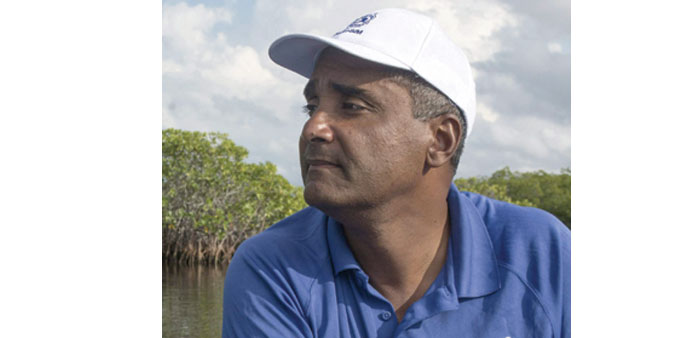Reuters/Miami
A Haitian marine biologist who successfully fought to create a national park to protect a large swathe of Haiti’s north coast has won a prominent US environmental activism prize.
Jean Wiener was awarded a Goldman Environmental Foundation prize for his efforts to establish the Caribbean nation’s first Marine Protected Areas while working with local communities to promote sustainable fishing practices and preserve mangrove forests.
In awarding the $175,000 prize, the Goldman foundation highlighted Wiener’s efforts in overcoming extreme poverty and political instability in Haiti, a country with few full-time environmentalists and almost no government programmes to protect natural resources.
Wiener, 50, was honoured along with five other prize winners at a ceremony in Washington for a campaign he led to create the Three Bays National Park, covering 75,000 sq km stretching from the city of Cap-Haitien to the border with the Dominican Republican.
The park, created in 2014, protects the vulnerable eco-system of over-fished waters in the bays of Limonade, Caracol and Fort Liberte.
The area includes Haiti’s second-largest mangrove area, as well as one of its longest barrier reefs and important seagrass beds. That trifecta of coastal eco-sytems “makes it probably Haiti’s most productive coastal system in terms of marine life and fish nurseries,” Wiener said in a phone interview.
The Fort Liberte bay had been targeted for port development by a US government-backed project which was scrapped last year over environmental concerns and lack of investor interest.
A schoolteacher in Port-au-Prince, Wiener studied biology at the University of Bridgeport, Connecticut. He is the founder of the Marine Biodiversity Protection Foundation (FoProBiM), Haiti’s only non-governmental environmental organisation focusing on coastal and marine areas.
Funded by the United Nations and the US Agency for International Development, FoProBiM works with community groups to preserve natural resources, including fishing waters, endangered coral and mangroves which are cut down for charcoal.
“It’s been over-fished to a point where the fishermen are catching almost nothing except juveniles,” Wiener said.
Despite tough regulations, “there’s no throwing anything back,” he said. “The rules need to be updated and more importantly enforced. There’s barely a Coast Guard.”
The other Goldman prize winners for 2015 are from Myanmar, Canada, Scotland, Honduras and Kenya. The prize, created in 1990 by Richard and Rhoda Goldman to encourage environmental protection, has been awarded to activists in more than 80 countries.

